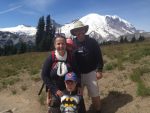Rabbi Adam Rubin, wife Judith and their children. (photo from Rabbi Adam Rubin)
When Rabbi Adam Rubin and his family visited Congregation Beth Tikvah in February of this year, they fell in love. “They seemed to like us, too, I guess, because I got the job,” the rabbi told the Jewish Independent.
Rubin was born in Santa Monica, Calif., and grew up in Tustin, a small community outside of Los Angeles. He went to a public high school, which had only a few Jews, and first found a connection to Jewish community when he went to Jewish summer camp in northern California.
Rubin worked as a counselor in his college years, then furthered his journey into Jewish culture with a trip to Israel. He had a remarkable experience there, staying with a working-class Israeli family and wandering around Jerusalem for hours every day, fascinated. After a friend handed him a brochure for Pardes Institute of Jewish Studies, he was intrigued and made plans to study there.
After graduating from University of California, Berkeley, with a degree in American and European history, Rubin spent two years at Pardes. Despite the traditional yeshivah curriculum, there is no expectation of Orthodox observance. Free to experiment and find his own relationship with Judaism, Rubin became observant.
He studied Israeli politics and history and went on to do his doctorate at University of California, Los Angeles, in Jewish history, focusing on the Hebrew culture of the Yishuv in the 1920s and 1930s, in the era of Hayim Nahman Bialik. He was interested in people who came to Palestine to refashion Jewish life, as Ahad Ha-am (Asher Ginsberg) and the followers of cultural Zionism did. Cultural Zionism was more focused on the renewal of Jewish culture than the political renewal of a Zionist state.
Rubin settled into an academic life in Los Angeles, teaching rabbinical students at Hebrew Union College (HUC) as well as students at University of Southern California (across the street). After several years in academia, though, he was less than happy.
“The core thing in an academic life is research and writing,” he said. “I can do that, but I’m a people person, very social. I love to be with people, and my favourite part of the job was the faculty connection to the broader community, which HUC required of its teachers.” Also, over time, “the love of history faded and was replaced with the love of Torah.”
By that time, Rubin had become “egalitarian observant,” was involved in an independent minyan and had enjoyed a study chavruta (group, literally friendship) for years. He was “living a meaningful, wonderful Jewish life,” he said, “and didn’t feel like I needed to be a rabbi to do that.”
As he increasingly wanted to serve the Jewish community more directly and to be with people, he turned to the rabbinical path. After his ordination at Ziegler School of Rabbinic Studies, he became assistant rabbi at Beth Shalom, a Conservative synagogue in Seattle.
“I wouldn’t have been able to make this major transition without the support of my wife Judith,” said Rubin, noting that he needed to take a significant loss of income and become a student again to become a rabbi. His wife, an experienced elementary school teacher, will be teaching secular studies at Richmond Jewish Day School.
Although Rubin had a “great experience” at Beth Shalom, he wanted his own pulpit. “I used to joke that I was the oldest assistant rabbi in the U.S.,” he said.
The Rubins have two children: Elior, 7, who will be going to RJDS, and Na’amah, 3, who will be going to a francophone preschool.
The rabbi is looking forward to taking up the spiritual helm at Beth Tikvah.
“I love that Beth Tikvah congregation has a do-it-yourself spirit – a great deal of the religious life of the shul is done by the congregants themselves. I love how deeply committed our members are to the flourishing of the community, and how much they love and support one another.”
When asked what he hoped to bring to Beth Tikvah, Rubin replied, “My passion for exploring the spiritual riches of the Jewish tradition and sharing the sacred experience of living a life of mitzvot, combined with a commitment to the intellectual rigour and seriousness of deep Torah study.”
Matthew Gindin is a freelance journalist, writer and lecturer. He writes regularly for the Forward and All That Is Interesting, and has been published in Religion Dispatches, Situate Magazine, Tikkun and elsewhere. He can be found on Medium and Twitter.

